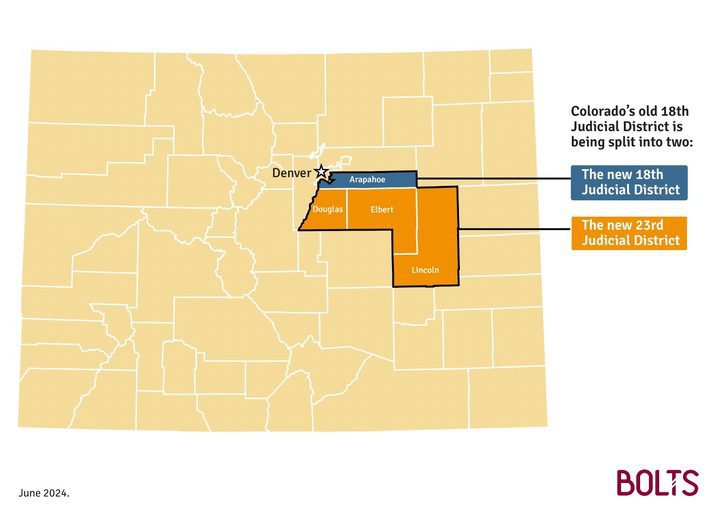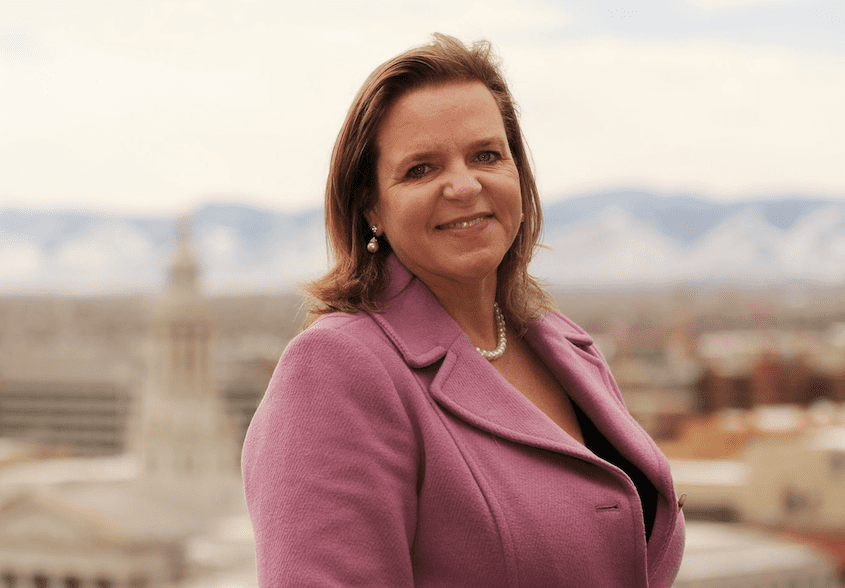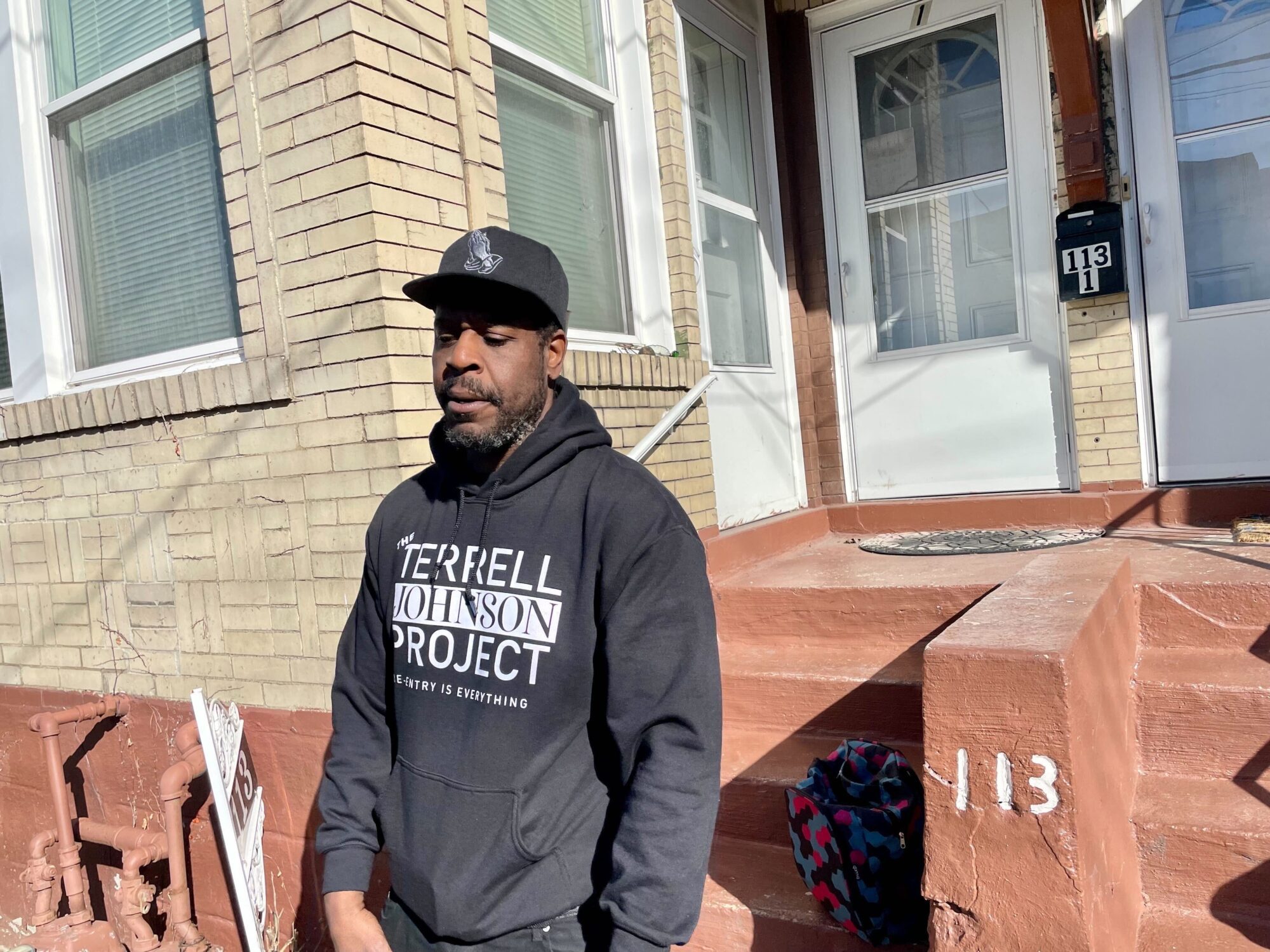A New Boundary Sends Suburban Colorado Down Opposite Paths on Prosecution
Colorado split its largest judicial district. Now the more liberal Arapahoe County is likely to elect a reform-minded DA; Douglas County may bring a punitive prosecutor back into office.
| July 8, 2024

Editor’s note (Nov. 7): Amy Padden and George Brauchler won the DA races in the new 18th and 23rd Judicial Districts, respectively.
George Brauchler, a former prosecutor who was a face of tough-on-crime politics in Colorado for much of the last decade and a leading voice among death penalty proponents in the state, is close to completing his political comeback.
In late June, he won the Republican primary in the race to become the next district attorney in Denver’s conservative south suburbs, where he already served as DA from 2013 to 2021 and is favored to win in the November general election.
In his latest bid for office, Brauchler has added to his usual zero-tolerance arsenal: He is now promising to seek jail time for any adult who steals anything in his jurisdiction, from a candy bar to a car. “I’m going to put out a PSA, I’m going to do a press conference, and I’m going to let everybody that will listen know,” Brauchler told Bolts this week. “If you come to this jurisdiction and steal from us, you should expect to go to jail.”
This policy, which he described as an experiment, would be unusually punitive; Colorado courts often address small-value theft through fines, probation, or diversion programs. Tom Raynes, a former DA in western Colorado who now directs the Colorado District Attorneys’ Council, told Bolts he doesn’t know of any prosecutor in the state who has pursued jail time in every theft case.
But if Brauchler is elected in November, he’ll no longer have any authority over a big chunk of the region he used to lead. That’s because the state has split his old 18th Judicial District in two.
The populous and suburban Douglas County, plus the more exurban and rural Elbert and Lincoln counties, are forming a brand new and GOP-leaning 23rd Judicial District. That’s where Brauchler is running this year.
Arapahoe County, a blue swath of more than 600,000 residents that contains most of the city of Aurora, will now have a DA of its own, rather than share one with its redder neighbors to the south. (It’ll still be called the 18th district.)
The frontrunner to win Arapahoe County’s first standalone DA race this year, Democrat Amy Padden, is a reform-minded attorney whose tone is very different from Brauchler’s.
Her belief, in stark contrast to his, is that “we need to find alternatives to incarceration.” While Brauchler vows to seek jail time in many low-level cases, Padden said she’s loath to take that approach because it risks destabilizing individuals, families, and, eventually, whole communities.
“Someone is locked up over the weekend, for three days, for however long it is, and they may very well lose their job, their house, have all kinds of consequences,” she told Bolts. “That’s going to increase the chances they may reoffend.”
“We’re not going to prosecute our way to a safer community,” Padden added. “The way we reduce crime is to see if there are ways to rehabilitate folks and get them back on their feet.”
With Brauchler’s and Padden’s opposing agendas, counties that used to form one behemoth district are now poised to take starkly divergent paths.
Assuming that the new districts vote according to their usual partisan leans in November, similar criminal cases may be met with starkly different prosecutorial responses—depending on which side of this new administrative boundary they occur.

This would mark a greater change in Arapahoe County, an increasingly liberal area whose residents’ voting preferences have been drowned out by the redder parts of the old 18th district. Residents there decisively voted against Brauchler in 2012, and against Brauchler’s Republican successor, John Kellner, in 2020.
Arapahoe County, which is much more racially and economically diverse, has also long been a place with a particularly brutal and racist law enforcement presence, by the state’s own admission. By the end of Brauchler’s last term in office, in 2020, its imprisonment rate was four times higher than that of Douglas County.
Four years ago, Colorado lawmakers chose to divide the district due to its explosive population growth. A bipartisan law adopted in March 2020 split it in two, but provided that the split would only be effective after the 2024 elections. Coloradoans in 2022 overwhelmingly approved a measure to give each new district its own separate judges.
The state split no other judicial districts. Colorado will now have 23 district attorneys, up from 22.
“The reason we do districting is to take account of the evolving nature of communities, and Douglas and Arapahoe counties have changed a great deal,” said state Representative Mike Weissman, a Democrat who was one of the law’s sponsors.
“The two large counties were pretty politically distinct and had two different philosophies about criminal justice and public safety,” he added. Arapahoe County voted for Joe Biden by 25 percentage points in the 2020 presidential race. Douglas County voted for Donald Trump by 7 percentage points; overall, the new 23rd district backed him by 10 percentage points.
When Padden ran for DA a first time in 2020, in the old district, she overwhelmingly carried Arapahoe County but lost Douglas, Elbert, and Lincoln counties by large margins. Kellner, who is not seeking reelection this year, beat her by 0.2 percentage points districtwide—a margin of under 1,500 votes, out of nearly 600,000 tallied.
This year, Padden just has to win Arapahoe County. And she’ll face a familiar name in GOP nominee Carol Chambers.
Chambers, like Brauchler, is attempting her own comeback: She was DA in the 18th District from 2005 to 2013, during which time she generated plenty of controversy—she was accused of hiding evidence at in a high-profile trial, and offered “conviction bonuses” to deputies who hit quotas—and zealously sought the death penalty. (On the day Colorado repealed the death penalty, in 2020, two of the three people on the state’s death row had been prosecuted by Chambers. All three were Black men who attended the same high school in Aurora.)
Chambers, who failed to carry Arapahoe County the last time she was on the ballot, in 2008, even as she won districtwide, isn’t running much of a campaign so far. She has no website and has spent no money this cycle, according to state campaign finance records.
In the new 23rd district, Brauchler will face a Democrat who, by her own admission, also has no organized campaign for now. Karen Breslin told Bolts she was recruited to run for the position by Democratic Party leaders after her recent failed bid for the 4th Congressional District, but that she has not yet been able to turn her focus to the DA race.
Asked how she’d be different from Brauchler as a prosecutor, Breslin told Bolts, “I’m going to have to punt on that. I don’t know his record with enough detail.”
Padden’s approach to prosecution is much more in line with the statewide political trends that Brauchler has railed against during his campaign.
Since Democrats gained full control of the state government in 2018, the legislature has, among other reforms, lessened penalties for drug possession; limited the use of cash bail and pretrial incarceration in general; placed a slew of new restrictions on police power; mandated polling places in local jails; and abolished the death penalty.
“Every year I’ve said it’s the most offender-friendly legislature we’ve ever seen, and every year I’ve said it, I was right,” Brauchler said. “They’ve continued to whittle away at the amount of accountability that can be heaped on someone for their criminal conduct.”
During his earlier stint as DA, Brauchler frequently pushed back against statewide sentencing reforms. For instance, he resisted a law that allowed judges to resentence people serving life without parole for crimes they committed while they were children. He fought against resentencing requests and unsuccessfully tried to get the law struck down as unconstitutional. He also talked and wrote prolifically against the legislature’s move to repeal the death penalty.
Now, with his proposal for jail time in all cases of theft, Brauchler is practically inviting a showdown with the legislature, telling Bolts he expects Democratic lawmakers will draft a bill to reform theft sentencing laws once they see his policy in action.
Brauchler noted that he doesn’t necessarily want petty theft to result in defendants losing employment; he said he’s open, for example, to recommending sentences that can be served over weekends only. But it is essential, he feels, to create a standard of guaranteed incarceration for minor offenses, in order to stem more serious crimes. “I’m a firm believer that if we take this thing seriously and we do it right, it has an impact on a whole host of other crimes in the jurisdiction,” he said.
Should Brauchler pursue this policy, he’ll face major opposition from civil rights groups and defense attorneys.
“It is deeply concerning if jail time is sought across the board, for low level offenses, because we know that’s not in the interest of justice,” said James Karbach, director of legislative policy for the state’s public defender office, and formerly the lead public defender in Arapahoe County during most of Brauchler’s time as DA. “We know that’s not effective at promoting public safety; it can be destabilizing and actually provide worse outcomes. It’s expensive. And the research shows that doing that doesn’t work.”
Indeed, research has shown that long prison sentences and short jail stints alike often harm, not aid, efforts to prevent recidivism. This is particularly pronounced among people with substance use issues and other behavioral health disorders that jails and prisons are commonly unequipped, or simply unmotivated, to treat.
Severe crackdowns against low-level offenses have also been found to disproportionately increase punishment of people of color—a population already disproportionately policed and incarcerated in Colorado and the country overall.
Rebecca Wallace, policy director at the Colorado Freedom Fund, works closely with people who face detention for minor offenses. The Freedom Fund pays cash bail to get poor people out of jail ahead of trial, and advocates at the statehouse, and Wallace has no doubt about how a blanket policy of jail time for every theft charge would play out.

“Most of the people who are picked up for petty theft are people experiencing extreme poverty, and many of them homelessness, and their theft is related directly to that scarcity,” Wallace told Bolts. “When people who are in those circumstances go to jail, quite frequently they lose all their possessions because they’re homeless. They lose their animals. They lose connection with service providers, with health providers, treatment providers, whatever community they have established. That loss can sometimes take months or years to reestablish after spending only a short time in jail.”
While there is plenty of research supporting Wallace’s case, Braucher says he’s observed that theft, including petty theft, is motivated by “greed” and not by desperation.
“This mythical story of the mom that’s out there stealing a loaf of bread to feed her kids—I’ve been doing this since ‘94, man. I’ve never once seen anything that approaches that at all,” he said.
Wallace is skeptical that Brauchler would be able to carry out his plan, as it would require system-wide buy-in throughout the 23rd district. He’d need police to increase low-level arrests, judges to approve more jail time for petty charges, and cooperation from local sheriffs who run the jails Brauchler wants to fill.
In her work at the Freedom Fund and in her previous role with the ACLU of Colorado, Wallace says she’s lately found general bipartisan disinterest in Brauchler’s kinds of ideas among law enforcement officials and lawmakers.
“What we have found in working to reduce incarceration for low-level offenses is that Colorado DAs want to spend their time working on people who commit serious offenses with victims,” Wallace said. “I understand he wants to come in and shake that up and take us backwards, and I have faith that he’s not going to have the ability as a one-man show to do that.”
Should he and Padden both become DAs, Bauchler said he’ll make a point to build a working relationship with the Democrat who’d lead prosecution next door. But, he added, “Obviously, I’d prefer to have someone who is more like-minded in that position.”
He cited, among other differences between them, Padden’s views on prosecuting kids as adults. (Padden criticizes the DA’s office for transferring minors to adult system too frequently, and she has said she would only do so “in the most extreme cases.“) “That kind of an approach, if she sticks to that—yeah, that’s going to make things more challenging,” Brauchler said.
Padden, too, expects ongoing disagreements with Brauchler.
“I’m not surprised by his frame of mind. That’s always been his frame of mind,” she said. “But what we’ve been doing in the past hasn’t worked. People’s entire lives can’t be defined if they make one mistake.”
The article has been updated to reflect Brauchler and Padden’s statements on juvenile prosecutions.
Sign up and stay up-to-date
Support us
Bolts is a non-profit newsroom that relies on donations, and it takes resources to produce this work. If you appreciate our value, become a monthly donor or make a contribution.




